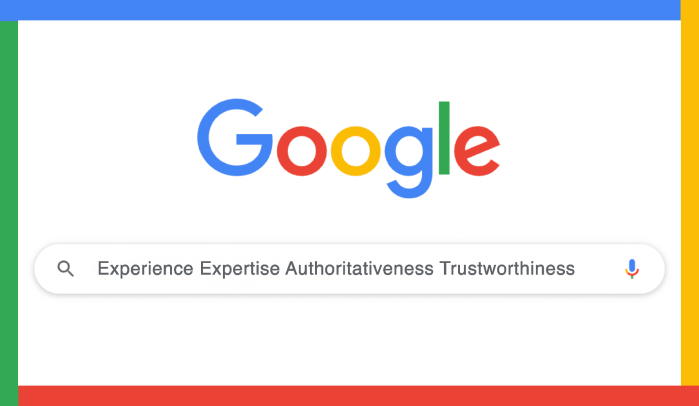UPDATED FEBRUARY 28, 2025
What is E-E-A-T?
E-E-A-T — formerly E-A-T — stands for Experience, Expertise, Authoritativeness and Trustworthiness.
According to Google’s Quality Rater Guidelines, these are four of the criteria used to rate your business and rank your website.
Good to know, right?
E-A-T isn’t a new guideline. It was first mentioned in 2014. The extra E (for Experience) was added in December 2022.
But what does each one mean and how can you demonstrate them to your audience and to Google?
Let’s have a look at each one in turn and go through some effective and practical ways to show it.
E is for Experience

What does Experience mean?
Experience refers to your personal experience of doing what you do.
To understand what that means, think about the:
- Length of time you’ve been in business or working in the industry
- First-hand experience you’ve had
- Things you’ve learned
- Knowledge you’ve accumulated.
The value of Experience
When you have experience, you’ll write with more expertise and authority. And you’ll talk about your own experiences, using first-hand examples.
As time goes on, this will become increasingly important, because genuine human experience is something AI can’t replicate.
How to demonstrate Experience
You can weave your experience into your web copy and blog content in a variety of ways. For example, using facts, dates, case studies and storytelling.
Not only will this demonstrate Experience, it will make your copy and content unique.
Give proof of your Experience
Web copy and blog content that includes:
- Qualifications you’ve gained
- Breakthroughs you’ve made
- Problems you’ve solved
- Notable projects you’ve worked on.
Indicate your length of service
Web copy and blog content that includes:
- The year your business started
- Details of business milestones that show achievements, growth and progress
- Storytelling that talks about how things have evolved and improved over time.
Incorporate your first-hand experience
Web copy and blog content that talks about:
- What you’ve done and what you’ve achieved
- Practical use of techniques, equipment and tools
- Original research or experiments you’ve carried out
- Your unique perspectives, thoughts and opinions
- What your experience has taught you
- Your successes and failures.
E is for Expertise

What does Expertise mean?
Expertise refers to the depth of knowledge you demonstrate on your website and in your blog content.
It might cover things like your:
- Qualifications
- Specific areas of expertise
- Knowledge and understanding of your business/industry
- Awareness and appreciation of what’s going on in your industry
- Practical skills and/or craftsmanship
- Understanding of your customer base.
The value of Expertise
The ultimate goal of E-E-A-T is building trust. And people are more likely to trust the word of an expert: someone who’s learned their craft, has had the experience and knows what they’re talking about.
So demonstrating your Expertise will give your audience — and Google — confidence in you.
How to demonstrate Expertise
You can create content specifically to demonstrate your Expertise.
Be consistent
For example:
- Use consistent messaging and don’t deviate from it
- Create content that’s relevant to your area of expertise
- Be genuine, authentic and true to what you know.
Use demonstrations
For example:
- Take your audience through your process
- Create educational how-tos and guides
- Reveal professional tips and insider knowledge
- Demonstrate your skills, techniques or products.
Talk the talk
For example:
- Answer your audience’s burning questions
- Bust the myths and misconceptions in your industry
- Provide your expert insight and information.
A is for Authoritativeness

What does Authoritativeness mean?
Authoritativeness refers to how much of an authority you are in your industry. A measure of that might be how many backlinks your content gets from people who cite it as a source.
You may not quite be there yet — and that’s okay — but it’s something you can aspire to and work towards.
The value of Authoritativeness
Authoritativeness is related —albeit distantly — to social proof, because it looks at how you’re perceived and rated by others. If others rate you as credible and reputable, their approval will send a strong and positive message to Google.
Your website’s Domain Authority
If your website has been online long enough, its Authoritativeness will have already been scored. We call this the Domain Authority score — or DA.
Every website is given a DA score between 1 and 100. The higher this score, the greater the indication that your website is an authority in its field.
You can check your website’s DA score using this SEO checker. You can improve it by following the advice below.
How to demonstrate Authoritativeness
Make sure people know your name
Brand awareness is important and, ideally, you want at least some people searching for you by name.
To get your name out there:
- Make sure your name and bio are on any content you write
- Use your name/brand name on all your marketing materials
- Use your name/brand name on your social media profiles
- Include your logo whenever you can because people remember images.
Be quick off the mark
Be one of the first to report on new ideas, innovations and information in your industry.
When people want to read about it or create their own content, they’ll probably look at yours first.
Create high-quality content
Content that’s widely shared on social media is a sign that your authority is increasing. So create in-depth, valuable content that people will be motivated to read and share and promote it on all your channels.
Earn high-quality backlinks
Backlinks from reputable websites will give your content more authority.
For more information on this, I’ve written a separate article entitled: A beginner’s guide to backlinks and link-building.
T is for Trustworthiness

What does Trustworthiness mean?
The ultimate goal of E-E-A-T is to show Google your website is trustworthy.
Your website’s Trustworthiness is a culmination of the Experience, Expertise and Authoritativeness you’ve demonstrated.
The value of Trustworthiness
Both your human audience and Google are looking for websites they can trust.
A trustworthy website is one your audience will buy from and Google will rank well.
How to demonstrate Trustworthiness
In addition to all the advice above, there are some elements of a website that are purely related to trust-building.
Show you’re a legitimate business
How to do it:
- Display your business address and place of business
- Display the landline number attached to your business address, if you have one
- Have a separate Google Business Profile, which shows your business has been verified by Google
- Have policies for privacy and cookies and a dedicated T&Cs page
- Have a cookie notice on your website that users can accept/decline
- Include photographs of your premises and your key people
- Include links to your social media channels.
Use independent verification
List/show logos for:
- Certifications/assurances
- Accreditations you’ve earned
- Your professional memberships
- Awards you’ve won.
Use social proof
- Display ratings from independent review sites, with a link to the site
- Display testimonials and reviews
- Use selected quotes from happy customers in the copy.
Do you need help to establish your E-E-A-T?
I’m Jenny Lucas, a freelance copywriter who specialises in SEO copy and content.
If you’d like to learn more about how content can work for your business and help you establish E-E-A-T, please visit my website, or get in touch.

You might also like…



